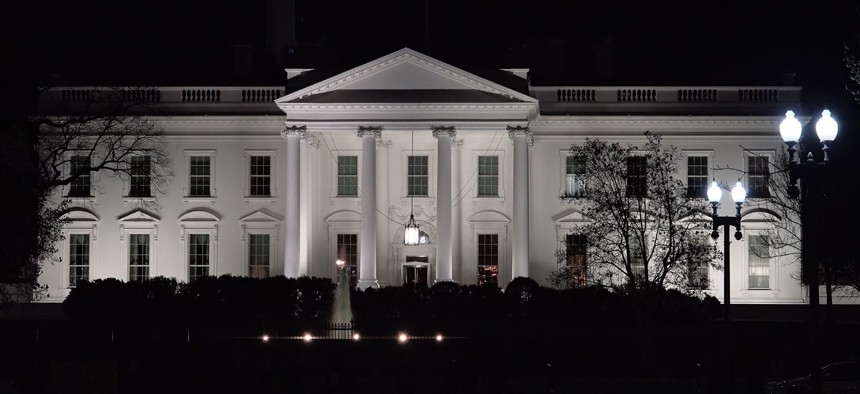City Leaders Meet With Trump Staff and Members of Congress

Shutterstock

Connecting state and local government leaders
Infrastructure and protecting the municipal bond tax exemption are top priorities.
WASHINGTON — City leaders have met with intergovernmental affairs and transition staff for the Trump administration, but are still awaiting details on how policies around infrastructure and the tax exemption for municipal bonds will take shape under the new president.
Cleveland City Councilman Matt Zone, who serves as the National League of Cities president, told Route Fifty in an interview this week that representatives of the League met Tuesday with Billy Kirkland, who is Trump’s deputy director for intergovernmental affairs.
The meeting was “kind of like a first date,” Zone said, and did not reveal new information about Trump’s proposals. Zone added that National League of Cities representatives had also met with Trump’s transition team in December.
At this point, two of the League’s top priorities include having a voice in whatever federal infrastructure proposals might emerge in the months ahead, and protecting the federal income tax exemption for municipal bonds from getting eliminated or curtailed as part of tax reforms.
About 35 local leaders from more than 20 state municipal leagues from around the country visited Capitol Hill this week to press these and other priorities as part of a “fly-in” coordinated by the National League of Cities. They had 42 meetings planned with federal officials, including members of Congress.
Trump has identified infrastructure improvements as one of the priorities for his presidency. And it is a key area where state and local leaders are looking to work with the new administration.
“When you look at the way we fund our infrastructure right now, we need a co-equal partner in the federal government,” Zone said. “It remains to be seen how that partnership grows.”
He said the League had not seen a formal infrastructure plan yet from the Trump administration.
U.S. House Speaker Paul Ryan said last Thursday that any infrastructure package developed in the coming months would feature a significant private sector component.
“Remember, this isn’t a trillion dollars of taxpayer spending. It is how do we leverage private sector dollars, so we can leverage more private sector spending on infrastructure, like pipelines and things like that,” Ryan said last Thursday on “Fox and Friends.”
A report two Trump advisers released before Election Day indicated that the president’s infrastructure plans could include tax credits to incentivize private investment in projects.
The report mentioned $1 trillion as a possible amount of investment federal tax credits could help spur over a decade.
Private pipelines are not generally the sorts of projects most states and municipalities are clamoring for.
Many are looking to improve roads, fix bridges and update drinking water and wastewater systems. And Zone said that while public-private partnerships might work well for bigger projects, they may not be a good fit for many smaller jurisdictions.
“That model really doesn’t work for all cities,” he said. Smaller cities, Zone noted, are typically “not looking for financing for billion dollar projects within their municipal borders.”
State and local officials as well as congressional lawmakers voiced similar skepticism toward public-private partnerships during a U.S. Senate committee meeting Wednesday as they discussed whether the deals are appropriate for funding infrastructure in rural America.
Keeping the federal tax exemption for municipal bonds in place is another leading issue for the National League of Cities.
“That’s something where our organization has kind of drawn a line in the sand,” Zone said. Later he added: “Right now, over two-thirds of all the public infrastructure projects in the United States are locally financed through muni bonds.”
The tax exemption means municipal bond investors do not pay federal income taxes on the interest they earn.
This arrangement is thought to keep borrowing costs lower for local governments and states that issue the bonds to finance projects. A common criticism of the tax break is that it costs the federal government in lost tax revenues while benefiting investors.
The U.S. Conference of Mayors and the National Governors Association have also staked out their support for preserving the exemption in recent weeks.
Trump appeared to offer his blessing for the municipal bond tax break during a meeting with mayors in December, according to mayors who attended. The National Association of Counties noted in November that a blueprint for tax reform, issued by House Republicans last year, did not include specific policy recommendations for the exemption.
Speaker Ryan said last week that lawmakers would likely begin work on infrastructure and tax reform measures in the spring, after taking action on health care. Trump and congressional Republicans have vowed to repeal the Affordable Care Act, also called Obamacare.
Zone said that when it comes to infrastructure cities are already “paying our fair share.”
“We don’t want the federal government to reduce their commitment,” he said. The National League of Cities is open to discussions with federal policy makers about where the money to pay for infrastructure might come from, he added. “But we want to at least be at the table.”
Bill Lucia is a Senior Reporter for Government Executives Route Fifty and is based in Washington, D.C.

NEXT STORY: Bay Area City Heading Toward Bankruptcy?; Iowa Looks at Preempting Cities on Minimum Wage





